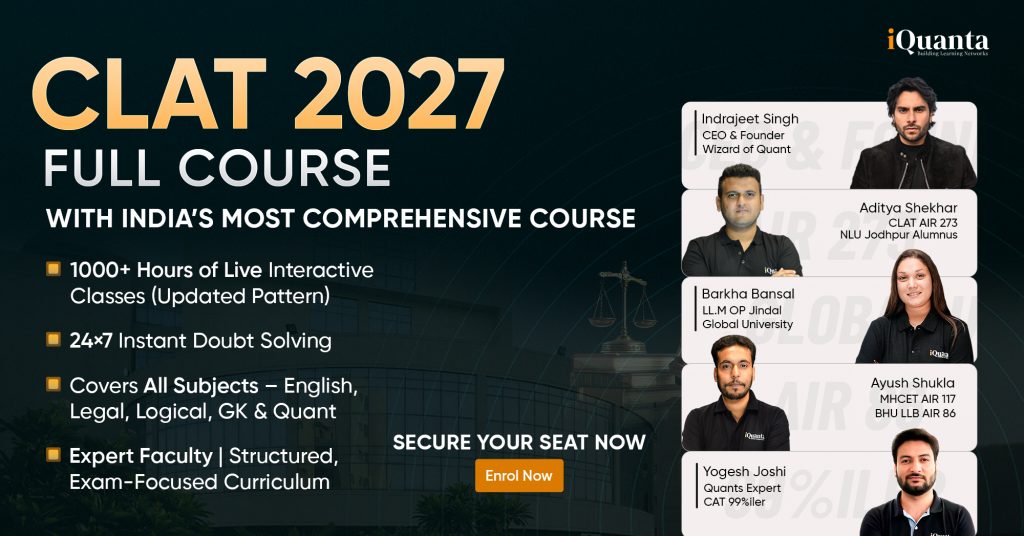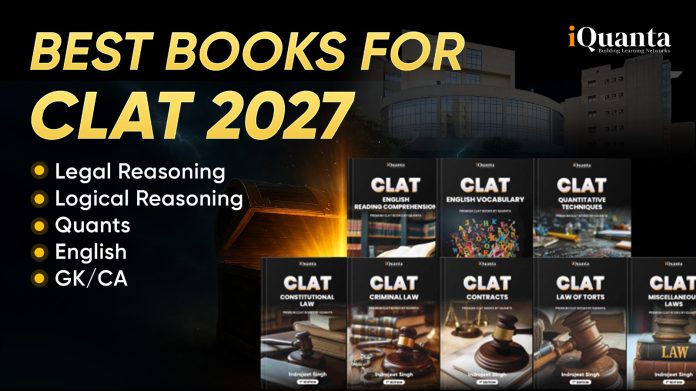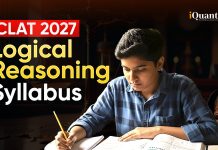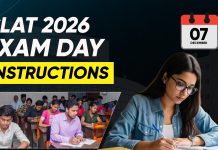The CLAT exam can make or break your law school dreams. Thousands compete each year for spots in top colleges like NLSIU. Pick the wrong study materials, and you waste time. But choose smart, and you build a strong edge.
For 2027, the test stresses real-world skills like analysis and quick thinking. No more cramming facts alone. You need best books for CLAT 2027 that will sharpen your mind for passages and puzzles. iQuanta stands out here. Their experts pick resources that work. They blend coaching tips with proven texts. This guide shows you how to use them. Get ready to ace every part.
Understanding the CLAT 2027 Book Selection Strategy
Analyzing the Current CLAT Exam Pattern and Weightage
CLAT 2027 will follow a pattern like in recent years. It has five main sections. English takes about 20% of the total. Legal Reasoning holds 25%, the biggest chunk. General Knowledge sits at 25% too. Logical Reasoning gets 20%, and Quantitative Techniques rounds out at 10%.
The test uses 120 questions in two hours. Most come from passages. You read short texts then answer based on them. This setup tests comprehension over memory. Focus on CLAT books that build those skills. iQuanta notes this shift favors deep understanding.
Weightage matters for your plan. Spend more time on Legal and GK. But don’t skip math. Even small sections can boost scores if you nail them.
“CLAT Best Book” Myth: Quality Over Quantity
Many students grab stacks of books. They think more means better prep. Wrong. You end up confused and burned out. Stick to one or two solid picks per section.
Top institutes like iQuanta push this. Their coaches say quality trumps volume. Pick texts with clear explanations and lots of practice. Avoid outdated ones. For CLAT 2027 Books, go for recent editions that match the pattern.
This approach saves time. You master concepts fast. Then, you practice smart. iQuanta’s tips help you spot the right fits.
Integrating Coaching Material with Standard Textbooks
Coaching adds value to books. iQuanta offers modules that explain tricky parts. Pair them with basics like polity texts for law basics.
Start with standard books for foundations. Use coaching notes to apply ideas. For example, read a chapter then solve iQuanta’s drills.
This mix builds clarity. You see how theory links to questions. Track progress with weekly tests from both sources. It keeps you on pace for 2027.
Mastering Legal Reasoning (LR) – The Core of CLAT
Legal Reasoning feels tough at first. But it’s key to high scores. Books here teach you to spot principles in stories. You apply rules to facts, just like lawyers do.
iQuanta stresses practice over theory. Their resources shine in this section. Let’s break down the best picks.
Foundational Texts for Legal Principles and Maxims
Start with “Introduction to the Constitution of India” by D.D. Basu. It covers basics like rights and duties. Simple language makes it easy for beginners.
Another gem is “Legal Awareness and Legal Reasoning” by A.P. Bhardwaj. It lists maxims and terms you need. Read the short chapters daily.
These build your base. iQuanta recommends them for Section A prep. They help you grasp Indian law without overwhelm.
Use them like building blocks. First, learn terms. Then, link to real cases.
Practice Resources for Argument-Based Questions
For hands-on work, grab “Word Power Made Easy” wait, no—for LR, try “Legal Reasoning for CLAT” by Universal. It has passages like the exam.
iQuanta’s own LR modules offer 100+ sets. They mimic CLAT style. Focus on arguments, not memorizing laws.
Practice one passage a day. Note patterns in questions. This sharpens your analysis.
Books like these turn confusion into confidence. You learn to pick key facts fast.
Actionable Strategy: Applying Law to Factual Scenarios
Read legal passages at speed. Aim for two minutes per one. Map facts to principles from your books.
iQuanta suggests journaling answers. Write why a rule fits or not. Review mistakes weekly.
This method sticks. You avoid common traps like assuming extra info. By exam day, you’ll handle scenarios smooth.
Essential Resources for English Language and Logical Reasoning
English and Logical sections test your brain’s quick side. English checks reading and words. Logical pushes puzzles and inferences. Both need sharp practice.
Books here focus on flow and logic. iQuanta pairs them with timed drills. You get better under pressure.
Comprehensive Guides for English Vocabulary and Grammar
“Wren & Martin High School English Grammar” tops the list. It fixes grammar basics in weeks. Short exercises keep it fun.
For vocab, “Objective General English” by S.P. Bakshi works great. It has lists and quizzes for CLAT passages.
Target comprehension too. Read editorials daily alongside these. iQuanta’s English packs add CLAT-specific tips.
Build a word bank. Review 20 terms a day. Soon, passages feel easier.
Dedicated Practice Books for Analytical and Critical Reasoning (LR)
Logical Reasoning needs books like “A Modern Approach to Verbal & Non-Verbal Reasoning” by R.S. Aggarwal. It covers patterns and arguments.
For critical parts, “How to Prepare for Logical Reasoning” by Arun Sharma fits. Lots of inference questions.
iQuanta highlights non-verbal bits. Use their sets for seating and blood relations.
Practice mixes verbal and visual. Solve 50 questions daily to spot tricks.
Integrating Timed Practice Sets for Both Sections
Divide time smart. Spend 45 minutes on English, 40 on Logical each session.
Use books for mocks. Time yourself strictly. iQuanta’s app tracks speed.
Review errors right away. This builds stamina. You’ll handle full tests without panic.
Conquering General Knowledge and Current Affairs (GK)
GK covers history, science, and news. It’s vast, but CLAT focuses on recent events. Books here update you fast.
iQuanta curates legal GK too. Their insights link news to law.
Stay current. Read one source daily.
The Best Monthly/Annual Compilations for Static and Dynamic GK
“Manorama Yearbook” gives annual overviews. It packs static facts like geography.
For current, “Pratiyogita Darpan” monthly issues shine. They cover politics and economy.
iQuanta suggests GK Today app with these. Track legal news like new bills.
Compile notes weekly. Focus on India-centric topics.
Specialized Focus: Legal GK and Landmark Judgments
“Landmark Judgments for CLAT” by Arihant helps. It sums key cases like Kesavananda Bharati.
Another is “Indian Polity” by M. Laxmikanth. Chapter on judiciary nails it.
iQuanta’s modules add quizzes on these. You retain better.
Read one case per day. Note impacts on rights.
Effective Revision Techniques Using GK Books
Make flashcards from book highlights. Flip through 50 daily.
Use mind maps for themes like environment laws. iQuanta templates guide you.
Revise in cycles. Weekly for current, monthly for static. This boosts recall.
Quantitative Techniques – Building Speed and Accuracy
Math in CLAT stays simple. It’s high school level. Focus on speed for data and numbers.
Books teach shortcuts. iQuanta’s sets practice real questions.
Don’t fear it. Practice cuts errors.
Core Textbooks for Foundational Mathematical Concepts
“Quantitative Aptitude for Competitive Examinations” by R.S. Aggarwal covers basics. Arithmetic and algebra in easy steps.
For CLAT fit, “Fast Track Objective Arithmetic” by Rajesh Verma. Shortcuts for ratios and percentages.
Start with concepts. Solve 20 problems per topic.
iQuanta links these to exam patterns.
Practice Modules Tailored for Data Interpretation (DI) in CLAT
DI dominates this section. “Data Interpretation” by Arun Sharma has graphs and tables galore.
iQuanta’s DI packs simulate tests. Heavy on pie charts and bars.
Practice one set daily. Note trends in data.
This builds intuition. You guess answers faster.
Strategy for Minimizing Calculation Errors
Learn approximations from Verma’s book. Round numbers to save time.
iQuanta tips: Double-check with options. Avoid long calc.
Track error types in a log. Fix one per week. Accuracy rises quick.
Conclusion: Finalizing Your CLAT 2027 Book Strategy
Top picks sum up your plan. For Legal, Basu and Universal. English needs Wren & Martin and Bakshi. Logical gets Aggarwal and Sharma. GK calls for Manorama and Laxmikanth. Quantitative sticks with R.S. Aggarwal and Verma.
These, plus iQuanta materials, cover all. Use them with strategy. Practice daily, review often.
Start now. Build your routine today. With these resources, CLAT 2027 success waits. Grab them and go. Your law career starts here.
Join CLAT 2027 Full Course






